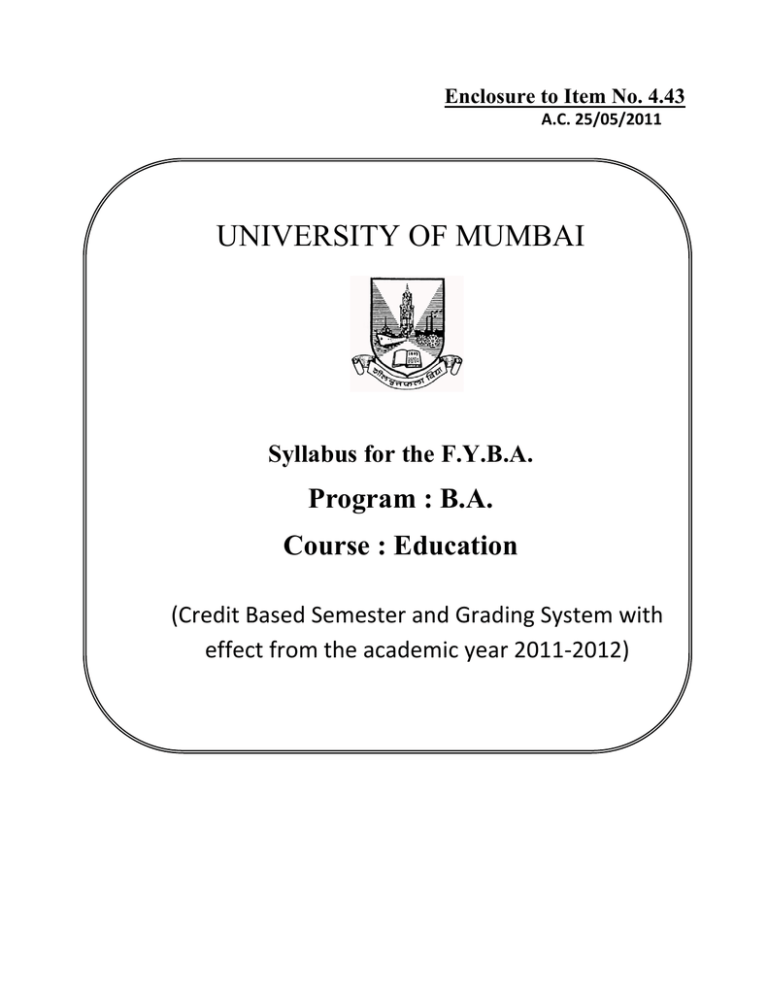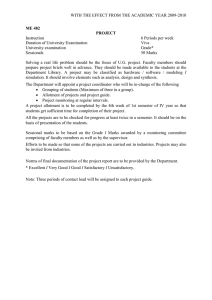4.43 Education - University of Mumbai
advertisement

Enclosure to Item No. 4.43 A.C. 25/05/2011 UNIVERSITY OF MUMBAI Syllabus for the F.Y.B.A. Program : B.A. Course : Education (Credit Based Semester and Grading System with effect from the academic year 2011‐2012) Syllabus as per Credit Based Semester and Grading system 1. Name of the Program: B.A. 2. Course Code: *** 3. Course Title: F.Y.B.A. - INTRODUCTION TO EDUCATION 4. Semester-wise Course Content: Semester I : June 2011 to Oct 22, 2011. Unit 1: Current Educational System in India : a) Functions of Formal Education b) Components of Formal Education – Pupil, Teacher, Curriculum, Educational institutions Unit 2: Parallel Forms of Education -- Informal Education & NonFormal Education. Unit 3: Role of Agencies of Education – Family, School, Peer group, Community, Media Unit 4: Role of State, National and International Agencies of Education– DIET, SCERT, Department of Education, NCTE, NCERT, UGC, UNESCO. Unit 5: The Definitions, Nature, Scope and Meanings of Education. Semester I I : November 14, 2011 to April 30, 2012 Unit 6: Education for National Integration a) Meaning & need of National Integration; b) Barriers to National Integration- caste, religion, language; c) Role of Education in promoting National Integration Unit 7: Education for International Understanding a) Need and significance of International Understanding b) Role of Education in promoting International Understanding Unit 8: Contribution of Indian Educational Thinkers to Education – Maharshi Karve, BhauRao.Ambedkar, Pandita Ramabai, Jiddu Krishnamurthy Unit 9: Role of Educationfor : i) Economic Ii) Political Iii) Social Development Unit 10: Practical: Each student must complete any one of the following & present a paper thereon: i) A study of Different Boards of Secondary and Higher Secondary Education ii) A study of the Role of NGOs in Education iii) A study of a BMC Municipal School, run by the BrihanMumbai Mahapalika Nigam 5. Objectives: i) ii) iii) iv) v) To create awareness of the different educational systems in India To appreciate the contribution of Educational Thinkers To understand the role of education in national development To compare different agencies of education To create an interest in the subject Education References and Additional References: 1. Development of Educational Theory and Practice — R. N. Safaya and B. D. Shaida, Dhanpat Rai and Sons, Jullunder, Delhi. 2. Theory and Principles of Education (13th Edition) by J. C. Agarwal, (2010) Vikas Publishing house, New Delhi. 6. Credit Structure: 3 Credits per semester (90 hours work) 7. Number of lectures per unit:Varies from 6 to 10 lectures (tabled below) 8. Number of lectures per week of each semester: 4 lectures / week UoM FYBA Education CB&GS Sem I Units No. of Student Lectures Hours 1 Current Educational System in India 8 12 2 Parallel Forms of Education 8 12 3 Role of Agencies of Education 10 12 4 Role of State, National, International Agencies of Education 10 12 5 Definitions, Nature, Scope and Meanings of Education 6 12 Compulsory Practical Work 10 30 52 90 Sem II 6 Education for National Integration 6 12 7 Education for International Understanding 6 12 8 Contribution of Indian Educational Thinkers to Education 9 20 9 Role of Education for Development 7 12 10 Compulsory Practical Work 25 34 53 90 Scheme of Examination: (40 marks 1stSem + 40 marks 2nd Sem) Internal Assessment Minimum passing: 16 marks out of 60 marks. (60 marks 1stSem + 60 marks 2nd Sem) Theory Examination 2 hours duration(1st week Oct’11 and 1st week March’12) 4 Essay-type questions of 15 marks each All questions are compulsory (with internal choices) Minimum passing: 24 marks out of 60 marks. Special notes (if any): *** Eligibility (if any):Completion of the +2 examination or its equivalent Fee structure: *** Special Ordinance or resolution (if any): ***



